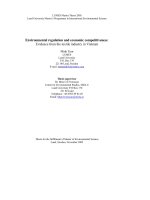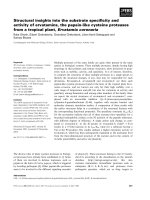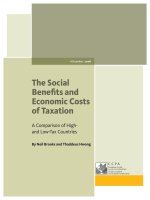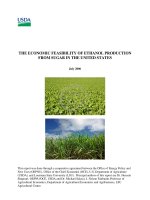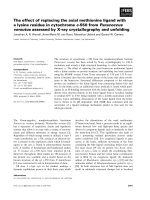Technical and economic feasibility of applying the Better Management Practices (BMP) to household aquaculture in Vietnam - MS7 " ppt
Bạn đang xem bản rút gọn của tài liệu. Xem và tải ngay bản đầy đủ của tài liệu tại đây (279.77 KB, 16 trang )
Ministry of Agriculture & Rural Development
Project 002/05/VIE
Technical and economic feasibility of
applying the Better Management Practices
(BMP) to household aquaculture in Vietnam
MS 7: Third six-monthly progress report
Date: March, 2008
1
Table of Contents
1. Institute Information ___________________________________________________ 3
2. Project Abstract _______________________________________________________ 4
3. Executive Summary ____________________________________________________ 4
4. Introduction & Background _____________________________________________ 5
5. Progress to Date_______________________________________________________ 8
5.1 Implementation Highlights________________________________________________ 8
5.2 Smallholder benefits:_____________________________________________________ 8
5.3 Capacity Building _______________________________________________________ 9
5.4 Publicity _______________________________________________________________ 9
5.5 Project Management _____________________________________________________ 9
6. Report on Cross-Cutting Issues___________________________________________ 9
6.1 Environment ___________________________________________________________ 9
6.2 Gender and Social Issues _________________________________________________ 9
7. Implementation & Sustainability Issues ___________________________________ 10
7.1 Issues and Constraints___________________________________________________ 10
7.2 Options _______________________________________________________________ 10
7.3 Sustainability __________________________________________________________ 10
8. Next Critical Steps ____________________________________________________ 10
9. Conclusion __________________________________________________________ 10
10. Statutory Declaration________________________________________________ 11
2
1. Institute Information
Project Name
Technical and economic feasibility of applying
the Better Management Practices (BMP) to
household aquaculture in Vietnam
Vietnamese Institution
Research Institute for Aquaculture No.1
Vietnamese Project Team Leader
Dr. Le Xan
Australian Organisation
The University of Western Australia (UWA)
Australian Personnel
Dr. Steven Schilizzi
Date commenced
January/2006
Completion date (original)
December/2007
Date commenced (revised)
August/2006
Completion date (revised)
December/2008
Reporting period
Third Six Monthly
Contact Officer(s)
In Australia: Team Leader
Name:
Dr. Steven Schilizzi
Telephone:
+61 8 6488 2105
Position:
Senior lecturer
Fax:
+61 8 6488 1098
Organisation
The University of Western
Australia (UWA)
Email:
or
In Australia: Administrative contact
Name:
Telephone:
Position:
Fax:
Organisation
Email:
In Vietnam
Name:
Dr. Le Xan
Telephone:
030.827124 or
04.8271368
Position:
Vice Director
Fax:
04.8273070
Organisation
Research Institute for Aquaculture
No.1
Email:
or
3
2. Project Abstract
Household coastal aquaculture farms, ranging in area between 0.5 ha and 3 ha, produce
90% of the output of farmed shrimp from in Vietnam, worth $USD 1 billion in 2004. The
economic viability and environmental sustainability of farms in this sector are threatened
by poor farming practices that lead to disease outbreaks, environmental degradation; crops
contaminated with chemical and antibiotic residues and decreased yields. Pilot–scale
Better Management Practices (BMP) can, and have been applied to large commercial
aquaculture ventures in Vietnam, with outcomes of improved yields and quality,
environmental sustainability and reduced risk of disease. However, difficulties arise in the
administration of BMP to small-scale household farms because of financial constraints,
lack of knowledge and little incentive or initiative to adopt BMP. The overall objective of
this project is to investigate the effectiveness of BMP application to household farms and
to develop methods to initiate BMP within this sector. The project will use consultative,
incentive, demonstration, training and dissemination methods that are appropriate to the
needs and abilities of household farmers.
3. Executive Summary
During 6 months from Sep 2007 to Feb 2008, the CARD 002/05/VIE project finished all
activities planned for the third 6 month period. Three Vietnamese staff visited the University
of Western Australia from 02 to 10 December 2007. The purpose of this trip was for the
Vietnamese team to get together with the Australia team to discuss the outcomes and project
activities. In addition, the method of data analysis, analysis of data pilot and outline of report
of MS-8 was completed during this visit. A workshop for the first year’s project
implementation, in order to sum up the project results of that first year and improve the BMP
guidelines applying to the second year, was organised in Thua Thien-Hue. This workshop is
a forum to discuss the project outcomes and planning among project related partners such as
provinces, communes, Aqua-clubs and demonstration farms. The project extension materials
were improved in case of content for second year training and provide extension
documentation to provinces and farmers. A visiting trip to RIA1 for Australian expert was
conducted. The purpose of this trip is to evaluate the project’s progress and promote the next
activities. In Feb 2008, the BMP training course was organised in Thua Thien-Hue for
attendence of extension workers and shrimp farmers. Things covered in this training course
included the environmental equipment for provinces and demonstration farms, support to
partially-fund shrimp seed, and the checking and detection of shrimp diseases on trial farms
before stocking the second year.
4
4. Introduction & Background
Project objective:
The overall objective of this project is to investigate the effectiveness of BMP application to
small-scale household farms through reducing negative environmental impacts, increasing
yields, lowering risks and improving product quality - thereby contributing significantly to
long-term poverty alleviation and income generation for households directly involved in
aquaculture production chains.
The short term objectives of the project are: a) to carry out an analysis of current status of
household aquaculture and identify incentives and constraints to BMP application; b) to
develop appropriate BMP guidelines and manuals for household aquaculture in the North
Central region of Vietnam; and c) to build capacity for BMP application among stakeholders
involved in aquaculture product market chains, especially smallholder producers.
Output expected:
Project outcomes will be the development of methods for dissemination and utilisation of
BMP amongst household farmers, leading to tenable farm practices, reduced risk of disease,
reduction in environmental degradation, increased yields and improvement of economic
viability of the sector in the long term. The project will contribute to the Government of
Vietnam’s Comprehensive Poverty Reduction and Growth Strategy (CPRGS), which is
aligned with CARD program strategic framework.
Approach and strategy:
The project will involve three stages: a) analysis of current status of household aquaculture
practices and identification of incentives and constraints for BMP implementation; b)
development of appropriate BMP guidelines and manuals for household aquaculture through
participatory on-farm and community trials; and c) building capacity for BMP
implementation and opening dialogues with exporters, traders and processors to explore
market incentives for BMP promotion.
For the first stage, the project must begin with a review of the literature and experience
concerning BMP in the region and move to analysis of current small farm practices and the
current production, health and resource status of household farms, and incentives and
constraints to BMP implementation. The baseline study will be used to gain experience in
methods to derive relevant information as well as equip research staff and fisheries officers
with a comprehensive picture of the present status of household aquaculture in three
provinces of Vietnam. At the end of the first phase, a draft action plan and sites for BMP
demonstration will be prepared and selected by involved stakeholders.
For the second stage, the project will focus BMP demonstration on two main shrimp
aquaculture systems namely i) semi-intensive and ii) improved extensive which are
considered as the dominant shrimp aquaculture models in the North Central region of
Vietnam. Selected small scale aquaculture farmers from these two types will be encouraged
to form aqua-clubs or associations for BMP demonstration. The roles of demonstration
farmers from these groups are in consultation with staff from RIA1, UWA and local
extension centers to select appropriate BMP to their conditions and to maintain a farm diary
that records all inputs into the trials and relevant indicators as the trial progresses. Through a
participatory process, relevant stakeholders such as farming communities, extension workers,
researchers and fisheries department staff will be participating in BMP selection and
supervision and monitor experimental trials that are being implemented by demonstration
5
farmers. Data collected by demonstration farmers and other regular data collected by RIA1
and fisheries staff will be used to establish project findings.
For the third stage, findings of the project will then be used by demonstration farmers,
extension workers and RIA1 staff to develop suitable BMP guidelines and training manuals
for small farmers and extension workers, which will be disseminated through communication
channels to build capacity for concerned stakeholders at all levels. Demonstration farmers,
extension officers, BMP guidelines and training manuals and farmer associations will be key
participants and factors in the dissemination of outcomes of the demonstration trials and the
implementation of BMP throughout the regions. Those demonstration farmers, who are
trained in: the use of basic water quality equipment, feeding strategy, selection of quality
seed and some extension skills by the project technical staff, will disseminate the project
findings to other farmers in the region. Market incentives for BMP implementation and
product quality requirement will be explored by opening dialogues with local traders,
collectors, whole traders, processors and importers. These stakeholders will be invited to
participate in project activities such as training and workshops to share their concerns and
product quality requirements with small scale producers.
Methodology:
Baseline study for assessment of BMP status:
Standardised surveys and participatory assessment methods will be developed by RIA1 and
UWA and used for assessing current aquaculture status, incentives and constraints of farmers
to BMP application and draft BMP action plans for demonstration at household farm level. In
each province 30 household farms will be sampled. The questionnaire will be designed to
elicit information on current farming practices, status of farm production, socio-economic
and environmental conditions, constraints and interests of household farmers in adopting
BMP on their farms. Data will be processed and analysed by staff at RIA1 and UWA to serve
as the basis for demonstration farm selection and kept as baseline indicators for comparison
with demonstration and control farms during and after the project implementation.
On farm trials for BMP development:
The trials will work with two types of common farming systems practiced by household
farmers: semi-intensive and improved extensive. In the semi-intensive systems, a group of
20-30 farms in each province will be selected and be encouraged to form an aqua-club or
association for BMP demonstration. BMP practices will be promoted and shared among
group members throughout the project implementation period. In the first year, each semi-
intensive group will select 1 household farm to demonstrate BMP application through
experiment treatment. To be considered for selection, household farms need to already
conform to some initial criteria for BMP such as appropriate infrastructure and irrigation
systems. In addition, farm size will be limited to 0.5 ha, farmers will need to be willing to
participate in the experiment, and have financial capacity to co-invest with the demonstration
trial. By participatory consultation, RIA1, UWA and farmers and extension workers at
project sites will select suitable BMP for demonstration once the project has been approved.
These may tentatively include: practices of pond preparation, seed certification and stocking,
feed and feeding management, water quality management, disease management, post-harvest
handling and product control. RIA1 staff will conduct seed control and certification for the
trials. Post-larvae that are free of white spot disease (WSD) and Monodon Baculovirus
(MBV) will be approved for use in trials. Hatcheries that can be certified disease-free will be
identified by RIA1 staff and stipulated for purchase of seed. Some data (observations of
6
shrimp health, feed tray clearance, water quality data) will be collected daily by farmers
using field test kits and equipment. Farmers will be given a farm record book to write all
practices, data recordings, seed, and feed and water inputs he/she applies to the farm.
Environmental data (salinity, pH, DO, BOD, NH
3
, NO
2
) will be analysed monthly by project
staff. Shrimp will be checked for chemicals and antibiotic residues one month before harvest
(with specific analysis for contaminants banned by EU). Data on BMP demonstrations will
be analysed by statistical methods to assess and validate impacts of BMP practices and as a
basis to draft a BMP manual. In the second year the BMP manual will be verified for all
members of the group and will be improved before recommending outcomes widely to all
communities.
In the improved extensive systems, two groups of 20-30 farms per province will be selected
and encouraged to form aqua-clubs or associations and the applying procedure will be similar
to the semi-intensive. The BMP practices selected for improved extensive farms may deal
principally with pond preparation, seed selection, stocking and some management practices.
One extension worker per project site will be assigned to assist demonstrated farmer groups
in the project site. She/he will play an active role in facilitating monthly aqua-
club/association meetings to promote BMP development and implementation. In addition,
monthly, RIA1 staff will visit the project site to assist and give technical advice and collect
environmental, disease and product samples to analyse and give feed back to farmers.
Building capacity for BMP implementation:
During the project implementation, capacity of stakeholders for BMP implementation will be
built through participating in project meetings, training courses, workshops, cross visits and
study tours:
Fifty-four monthly club/association meetings will be arranged each year to facilitate and
exchange experience on BMP implementation and development during and after the crop.
Eleven short training courses on different subjects will be organised and conducted for
participants during the lifetime of the project: one BMP training course for 48 demonstration
farmers and local extension workers before introducing BMP demonstrations in the first year;
one general training course on product quality management for 40 participants comprising
small producers, extension workers, collectors, traders and processors; three training sessions
on BMP application to semi-intensive systems and; six training sessions on BMP application
to improved extensive systems involving 90 and 180 participants respectively.
Three workshops will be arranged within the project, namely the inception workshop, the
project first year and terminal workshops.
Three cross province study tours will be arranged for 24 representatives of demonstration
farmers and extension workers in the target provinces in the first year.
One 10-day training course at UWA, Perth will be arranged for two RIA1 researchers
involved in the project on data analysis and reporting.
Two representatives of EU or Japanese importers/consumers will be invited to participate in
the project workshops and deliver lecture notes on product quality requirements for the
EU/Japanese markets. This will be effective in opening dialogues between producers and
processors/consumers.
2000 copies of BMP manuals for semi-intensive and improved extensive farming systems
will be developed at the end of the project.
7
5. Progress to Date
5.1 Implementation Highlights
The principal achievements to date have been:
1) Three Vietnamese project staff visited the University of Western Australia to work on
the methodology of data collection, data analysis and report writing.
2) A workshop was conducted for the first year’s project implementation, in order to
sum up the project results of that first year and improve the BMP guidelines which
would apply to the second year.
3) Improvements were made to the extension material and project-related documents
prepared for the second year training and extension documentation which were
provided to provinces and farmers.
4) A training course on BMPs for the second year project grow-out season was made in
Thua Thien-Hue for the attendance of local extension workers, officers and shrimp
farmers.
5) A visiting trip to RIA-1 for an Australian partner to evaluate project activities, and
support the technology and expertise to improve BMPs protocol was organised.
6) The environmental equipment was provided for provinces, demonstration farms and
supported partially-funded shrimp seed and checking for shrimp diseases for trial
farms before stocking
5.2 Smallholder benefits:
- Extension workers, fisheries officers and shrimp farmers were provided knowledge
on BMP though the training course in Thua Thien-Hue.
- Demonstrations were supported partly from the project with shrimp seed and fee for
post-larvae disease checking before stocking.
- Demonstrations with the environment equipment were provided to the provinces and
aqua-clubs.
- Provincial extension workers and local fisheries officers developed improved ability
of fisheries management and base community development. In addition, skill and
techniques in shrimp culture of the farmers were improved
- Vietnamese project staff and experts improved their abilities in terms of project
management, specialist knowledge through experience exchange with Australian
project partner team.
8
5.3 Capacity Building
- The BMP training course, cross visiting and aquaculture association meetings
contributed to capacity building in improved knowledge and culture experiences of
BMPs for local fisheries officers, extension workers and also for shrimp farmers.
- The Food Safety and Fisheries Veterinary training course provided the base
knowledge and practical skills in product quality management for provincial
extension workers, fisheries managers, commune managers, traders, shrimp product
collectors and shrimp households.
- The capacity of project management of project staff and project experts was greatly
improved.
5.4 Publicity
- The results of the BMP implementing of demonstration farms are being analysed and
prepared for MS-8 report.
- The project information and project results were published in the newsletter and the
website of Research Institute for Aquaculture No.1
5.5 Project Management
The project management has been effective.
6. Report on Cross-Cutting Issues
6.1 Environment
- The data of environmental and diseases monitoring were collected, analysed and
feedbacked to aqua-club and shrimp farms during crop implementing
- The data of shrimp product quality of demonstration farms are analysing and
preparing for MS-8 report.
6.2 Gender and Social Issues
- Female participants were given preference to attend the project activities such as
training courses, new technologies, cross visiting and association meetings.
9
7. Implementation & Sustainability Issues
7.1 Issues and Constraints
None to date
7.2 Options
None to date
7.3 Sustainability
No major issues
8. Next Critical Steps
1) Organising BMP training course for the second year project grow-out season for the
attendance of local extension workers, officers and shrimp farmers in Nghe An and
Ha Tinh provinces.
2) Organising monthly meetings to share BMP application expriences among farmers.
3) Monitoring parameters of water environment, shrimp diseases and culture techniques
(for the duration of the four month crop in each province). Demonstration farms
record all data of cropping by diary record book
4) Collecting shrimp product samples to check the quality of product before harvesting.
The indicators of shrimp product quality checking include E.Coli, TPC, Samonella,
Vibrio cholera; CAP, AOZ, AMOZ, SEM và AHD
5) Organising the trip for Australian Project team to visit Vietnam to evaluate project
activities, and support the technology and expertise to improve BMPs protocol.
6) Supervising and supporting for two students (1 M.Sc and 1 B.Sc) to do practising and
preparing for their thesis.
9. Conclusion
Progress of 002/05/VIE for 6 months from Sep./2007 to Feb./2008 has been highly
satisfactory and meet all activities of the third 6 month planning. However, the shrimp crop
in project areas had been negatively affected by the storms No.2, No.5 and white spot disease
outbeaks. The production results of project demonstration farms will be evaluated in the next
milestone report (MS-8).
10
10. Statutory Declaration
STATUTORY DECLARATION
COLLABORATION FOR AGRICULTURE AND RURAL
DEVELOPMENT PROGRAM
CARD Project Title: Technical and economic feasibility of applying the Better Management
Practices (BMP) to household aquaculture in Vietnam
CARD Project Number: 002/05/VIE
We, the undersigned, hereby declare that during the period Sep./2007 to Feb./2008, delivered
the following inputs to assist in implementation of the above project.
1: PERSONNEL INPUTS
Australian Personnel
Provided (Name)
Days in
Vietnam
Days in
Australia
Trips to
Vietnam
Steven Schilizzi 0 1.0 0
Elizabeth Peterson 2 10.0 1
Virginia Mosk 0 5.5 0
Total 2 16.5 1
Vietnamese Personnel
Provided
Days in
Vietnam
Days in
Australia
Trips to
Australia
Le Xan 15 0 0
Nguyen Xuan Suc 90 6 1
Tran Long Phuong 80 0 0
Nguyen Van Quyen 10 0 0
Mai Van Ha 15 0 0
Le van Khoa 10 0 0
Bui Kien Cuong 14 6 1
Dinh Van Thanh 10 6 1
Luu Quang Can 30 0 0
Nguyen Minh Duc 30 0 0
Pham Ngoc Hung 30 0 0
11
12
Project Progress Against Proposed Objectives, Outputs, Activities And Inputs
Project Title: Technical and economic feasibility of applying the Better Management Practices (BMP) to household aquaculture in Vietnam
Vietnamese Implementing Institution: Research Institute for Aquaculture No. 1
PROPOSAL PROGRESS REPORT
Narrative Information Required Performance
Measures
Assumptions Information Required
Objectives
1) Improving the capacity to
manage and practice project and
exchanging information and
experience on project
management for both
Vietnamese and Australian
partners
2) Providing knowledge of
BMP in shrimp farming for
provincial extension staff, local
managerial officers and
aquaculture farmers in three
provinces where the project is
implemented.
3) Improving skills of BMP
practice for officers, extension
staff and shrimp farmers in the
project sites .
4) Supporting for local
partners including Extension
Departements, shrimp clubs
demonstration farms and
shrimp households
1) Vietname team
visited the UWA, and
Australian team come
to the RIA1 to work
on the project.
2) Training on BMP
for 50 beneficiaries
of shrimp households
in Thua Thien Hue.
Providing the BMP
materials for shrimp
farms in 3 provinces.
3) Exchanging
Information and
experiences on
culture techniques
and management for
project participants
4) Providing
environment
materials and fund
for seed checking.
1) Completed
preparation on
content, data in order
to help the disscusion
success
2) Ensure training for
right beneficiaries
who are directly
involved in the
project or have
positive effects on the
project and shrimp
clubs.
3) Participants come
from different level:
management,
technical officies,
farmers, scienticts,
extension workers
4) Ensure supporting
for right
beneficiaries, right
kind and quanlity.
1) (a) Three Vietnamese project staff visited the University of Western
Australia to work on the methodology of data collection, data analysis
and report writing
(b) A visiting trip to RIA-1 for an Australian partner to evaluate project
activities, and support the technology and expertise to improve BMPs
protocol was organised
2) A training course on BMPs for the second year project grow-out
season was made in Thua Thien-Hue for the attendance of 50 shrimp
farmers.
Providing the BMP materials, shrimp culture diary book for shrimp
household and demonstration farms in the 3 provinces.
3) A workshop was conducted for the first year’s project
implementation, in order to sum up the project results of that first year
and improve the BMP guidelines which would apply to the second
year.
4) The environmental equipment was provided for provinces,
demonstration farms and supported partially-funded shrimp seed and
checking for shrimp diseases for trial farms before stocking
13
Outputs
1) The cross visiting and
exchange information between
Australian and Vietnamese
team are the base to improve
the project management ability,
information processing, data
analysis and reporting.
2) The shrimp culture practice
of farmers in the project sites
was improved though the BMP
training cources. More than 50
shrimp farmers in Thua Thien
Hue province were to benefit on
BMP practical skill from BMP
training in Feb. 2008
3) The BMP guideline was
improved by using the
contribution suggestions of
participants from the first year
workshop. The quality
suggestions came from local
officers and farmers who are
directly involve in the project
activities.
4) Providing the environment
equitments to provincal
extension centers, aqua-club
and demonstration farms. And
checking for shrimp seed of
household in the project sites
1) The experiences on project management, the project activities, the
training cource on farming management, envirenment and disease
management were discused to improve during visiting time of
Australian team in Vietnam.
The methodology of data collection, data analysis and report
writing have done during the Vietnamese team visiting Australia for 8
days in the UWA.
2) Two BMP cources was conducted in Thua Thien Hue provin in
Feb/2008 for attending of extension workers and shrimp households.
These cources applied the field-study methodology to train the
trainees on pond reperation techniques such as pond bottom clean,
lime application. Additional, the BMP training in the form of group
discussion methedology was also applied. Those methodologies will
be apply to train shrimp househulds in Nghe An and Ha Tinh in the
crop of year 2008 (March and April 2008)
3) A three days workshop was organised in Hue city to sum up the
results of the first year project implementing. In this workshop, the
participants include fisheries officers,extension workers, commune
officers, co-operatives, aqua-clubs and shrimp household. The
suggestions from attendents were helpful to improve the BMP
guidelines.
4) The environmental equitment such as DO, salinity pH (soil and
water), testkist of pH, BOD, COD, NH3, H2S… were provided to
local provinces partners include Extension Departments, shrimp
aqua-clubs and demonstration farms. And, supported partially-funded
shrimp seed and checking for shrimp diseases for trial farms before
stocking.
14
Activities
1. Planning /designing detailed
activities in 6 months (
9/2007-2/2008)
2. Find out visiters to UWA to
work with Australian team.
3. Prepare content, program and
personel for the first year
workshop.
4. Prepare trainers, content and
place for BMP training of
second year.
5. Contact local provinces to
choose trainees for the
training. Prepare place and
schedule for BMP training
6. Recording all production
related- information during
shrimp crop.
7. Supporting to local provinces
and farmer with the
equitment and seed test.
1. Coordinating project including planning, activities proposal and
agreement of implementation after having discussed with project
leader.
2. Ensure visiters who are directly involve the project activities and
making sure that they have good ability to work on data analysis
3. A total of 52 participants attend this workshop. Participants
include project staff, experts, technical staff, extension workers,
local management officers and demonstration farmers.
4. Giving BMP training were project contracted- experts including
culture technical, disease management, environment, community
- based management experts.
5. A total of 50 trainees coming from technical staff, extension
workers, local management officers and demonstration farmers
and shrimp housholds. 2 training courses training on BMP was
conducted in Thua thien Hue in Feb 2008.
6. Pond books were given to demonstration farmers to record any
information and data relating to pond production over the period
of crop.
7. The environmental equipment was provided for provinces,
demonstration farms and supported partially-funded shrimp seed
and checking for shrimp diseases for trial farms before stocking
Inputs
Personnel:
Day for working (Australia)
Day for working (Vietnam
Training, meeting:
Workshop, meeting
Education, training
Equipment & materials:
Small equipment
Product quality checking
Demonstration support
Others:
Personnel:
Australian team: 16.5 days
Vietnamese team: 352 days
Training, meeting:
Workshop, meeting: A$ 8,297
Education, training: A$ 9,527
Equipment & materials:
Small equiment: A$ 2,960
Product quality checking: A$ 4,754
Demonstration support: A$ 2,451
Others:
15
Travel
Tel, Fax, Internet and facilities
Reporting
Travel: A $ 4,085
Tel, fax, Internet & facilities: A$ 1,634
Reporting: A$ 3,051
Total:
A$ 36,759
16

